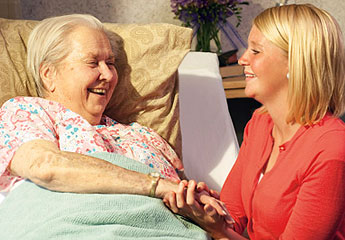
Old age associated diseases are defined as those whose frequency increases with senescence. Of roughly 150,000 people who die each day across globe, about two thirds die due to age-related causes. In industrialized nations, the proportion is much higher. Examples of aging-associated disease are arthrosclerosis and cardiovascular disease, cancer, arthritis, diabetic type 2, hypertension, mental illness like Alzheimer’s disease, Parkinson, loss of memory etc. Many of these diseases cannot be completely cured but of course we can prevent a few by changing lifestyle and food habits, control some with medications and diet control, and take care of few disorders through physiotherapy or just by being active. Following is a list of few age related illness and details on taking care in these cases.
- Obesity and Metabolic syndrome – About three-fourth of adults aged 60 years grow overweight due to various metabolic disorders, gall bladder diseases or cardiovascular problems. This leads to increased risk of developing diabetes and other chronic illness. The best way to combat this is by reducing intake of sweetened food with high-fructose content, avoiding process food with corn syrups, reducing alcohol intake and exercising regularly.
- Type II Diabetes – A large majority of people suffer from type II diabetes which is a condition characterized by decline in the body’s ability to reproduce insulin. Diabetes can also increase risk of developing heart attacks, strokes, loss of blood circulation, and kidney or eyes disorders. Dietary precautions, healthy lifestyle, exercise and regular medication like Metformin or insulin injections can help control one’s blood sugar level successfully.
- Cardiovascular disorder – Diseases related to heart and blood vessels like arthrosclerosis, coronary heart disease, heart failure, stroke and hypertension are a leading cause of death amongst old age people. A healthy lifestyle, exercising for at least 30 minutes a day, high fiber diet, low fat and low sugar/salted food and not being overweight can keep these symptoms at bay. Smoking, drinking alcohol should also be avoided.
- Arthritis – Nearly half of adult population suffers from arthritis. Managing your weight, avoiding too much strenuous activities and maintaining a healthy diet are few things which can help. Today, several forms of treatment are available that can provide relief from swelling and pain, surgeries like chondroplasty, abrasions or micro-fracture or oestochondral autograft.
- Osteoporosis – Another common disease observed in old people especially females is osteoporosis. However, this disorder can be easily taken care of by following simple steps like – quite smoking, reducing intake of alcohol, have plenty of calcium rich food like milk, fish and avoid intake of high acidic food mainly soda drinks since they encourage loss of calcium. Vitamin D is very essential in this case. Exposing yourself to early morning safe sun rays or consuming Vitamin D supplement can prove beneficial. Light weight bearing exercises are also helpful.
- Cancer – Though cancer does not exactly fall into the category of age related disorder, yet it is known fact that the risk for certain types of cancer increases exponentially with age. For women the risk of cervical cancer and endometrial cancer increases and hence regular examinations are crucial. Similarly incase of men risk for prostate cancer increasing and a periodical screening can help prevent further issues.
- Vision and hearing loss – Muscular degeneration, cataract, diabetic retinopathy and glaucoma affect a lot of people aged 40 and older. Eating food with high antioxidant content may be helpful in reducing vision loss. Vitamin supplements are also advantageous. Regular eye screening can help prevent vision loss by providing timely treatment. Avoiding too many of rock concerts and continuous use of ear-buds from walkman or iPods are few things which can help avoid hearing loss. Use of hearing aid is another alternative.
- Teeth – Though teeth can also get affected with old age, several easy options like implants, bleaching are available these days. Apart from medical care, brushing twice a day with fluoridated toothpaste, flossing regularly and regular dental checkups is quite important.
- Mental illness– Memory loss, Alzheimer’s, depression and few other illness are very much a part of old age associated diseases. Stress, anxiety and mental overload are few factors responsible for this. Exercising regularly, controlling blood pressure and diabetes and avoiding uncontrollable drinks, and smoking are few things which can help. Equally important is staying physically active. Seeking timely medical help prove beneficial to maintain better mental health. Make sure you enjoy some hobby, spent time with friends, participate in a sport and accept the changes to live a better life.
- Parkinson’s – Parkinson is a disease which affects brain in which nerve cells are either damaged or lost. It is a slow and continuous process and though it cannot be completely reversed, medication and physiotherapy can help patients lead a better life.
- Urinary incontinence – This is a condition where the person cannot hold or control the flow of his/her urine and is common symptom when a person laughs or sneezes. It is caused due to weakening of sphincter muscles. Using adult diapers to soak urine is one method to take care of this issue, while the other is to use Kegel exercise to strengthen muscles. Stimulation of tibial nerve and BOTOX treatment are more advances options.
Tremors – Shaky hands or legs accompanied by uncontrollable shiver or problems in performing routine task like writing, lifting object are commonly seen in elderly individuals. Tremors can be caused by deficiencies in vitamins, stress or mild strokes. Though these conditions do not have a full proof treatment right now, physical aids and gait training can be beneficial.
